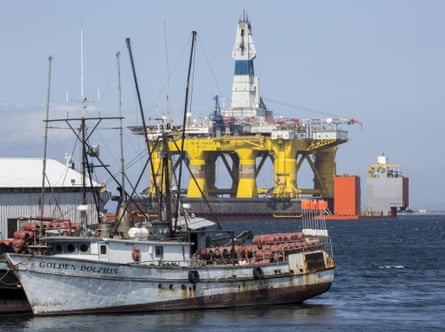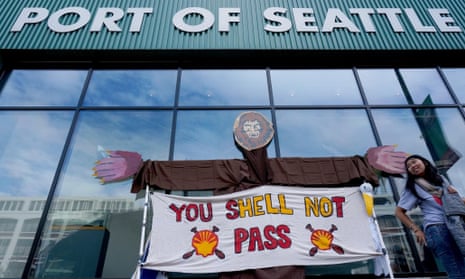Royal Dutch Shell wants to park two massive Arctic oil drilling rigs in Seattle’s waterfront – but the petroleum giant will have to get around protesters in kayaks and a mayor determined to take on climate change.
The fast-approaching battle with so-called kayaktivists is unfolding in the northwestern coastal city well known for embracing environmental causes, laying bare the high-stakes feud over oil exploration in the icy waters off Alaska.
Seattle Mayor Ed Murray took up the cause on Monday, choosing a renewable-energy group’s breakfast to announce that the Port of Seattle, a public agency that operates one of the nation’s busiest seaports, must get a new permit before it could host Shell’s drilling fleet. That could potentially thwart the company’s plans here – although Shell says it is closely watching events and did not expect delays.
The mayor urged the port to reconsider its two-year, $13m (£8.5m) lease with Foss Maritime, a company that has been in Seattle for more than a century and whose client is Shell.
“This is an opportunity for the port and all of us to make a bold statement about how oil companies contribute to climate change, oil spills and other environmental disasters – and reject this short-term lease,” Murray said in a statement.
Shell wants to drill this summer in the Chukchi Sea off Alaska’s northwest coast to determine whether there are commercial quantities of oil and gas. Arctic offshore reserves are estimated at 26bn barrels of recoverable oil and 130tn cubic feet of natural gas, according to US Geological Survey estimates.
Efforts to block Shell sent chills through the business community, prompting warnings that such regulatory uncertainty could threaten Seattle’s working port and jobs.
The local maritime sector, including ship builders, cargo vessels and tug companies, provides more than 22,000 jobs and contributes $2.1bn to the local economy, according to city figures.
Curtis Smith, a Shell spokesman, said the company used Seattle’s private shipyards in 2012 to refurbish a drill rig and do other work. “Seattle continues to make logistical sense,” because of its deep-water port, loading spaces and workforce, he said, adding that Puget Sound has long been a major staging ground for the Alaska oil industry.
Environmental activists say they relish the chance to make a public statement against fossil fuels dependence and global warming.

Drilling opponents will have an enormous visual aid – the 400ft (120-meter) long Polar Pioneer – parked against Seattle’s picturesque skyline to drive home their point, said Emily Johnston, with 350 Seattle, a group helping to organize events to protest against Shell. The rig is now in Port Angeles, Washington, but will head to Seattle sometime in the coming weeks.
Less than a mile (two kilometers) from where Shell’s drilling fleet will be moored, kayakers have been practicing flips and rescues, in case the water-based protest turns dangerous.
They plan to converge by land and in kayaks during a three-day “festival of resistance” starting 16 May. The demonstration has been dubbed the “Paddle in Seattle,” reminiscent of 1999 when thousands of protesters converged in Seattle during the World Trade Organization meetings, with some taking part in what became known as “the Battle in Seattle”.

Comments (…)
Sign in or create your Guardian account to join the discussion